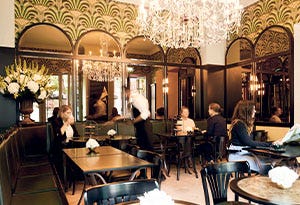Sometimes it’s fun to imagine a story from a different perspective. In this case, I took a memoir piece and wrote it from the other’s imagined point of view.
One Night in Berlin
The April night she burst through the Green Room doors, I was drunk. Not unusual for me, it’s true, but especially true that year. Certain that my ship had long sailed, that seventh brandy at breakfast had gone down particularly well. What was she, twenty? Twenty-one? Such an earnest face, the blush still on her. Me, slumped over that vile Chinese liquor, saying, “For me?” She strode across the room, hand outstretched. “My name’s Susan. From Canada.”
I introduced her to the fine people who’d been trusting enough to accompany me and pulled back a chair. As she came in and out of focus, I said, “So, a pretty girl from Canada, I guess I can’t do better than that.” (As I indicated earlier, these were not my finest days.) And she straightened her long spine and replied, “You can’t?” My friends all laughed as if they knew me. I did sense an urgency in her, words boiling on her tongue, but she seemed to understand where I was, the futility of speaking, and wisely doused that tongue.
Fred was there. He’s a good man, a fine pianist, and a rapt listener. All that morning he’d sat with me, listening. A good man, that Fred.
I had more to perform for those descendants of my people’s persecutors. But first, I offered her a drink. That young woman from Canada had the courage to sample my drink and the wisdom to choose Scotch instead. When I invited her to join us for dinner after the show, she set her glass down as if it were a fallen bird, her eyes like planets. What she saw in this washed-up poet I couldn’t fathom.
It was 1976 and I was forty-two years old. My star had slipped and fallen. Not seven glasses of brandy and not Fred’s keen assurance could convince me otherwise.
Every encore that night emptied my pockets a little more.
I knew she watched me across the Wintergarten’s dining room. I pulled myself up again and again to speak coherently to the earnest journalist, the one who didn’t ask why I’d spoken of the strangeness of performing for persecutors.
Fred was taking care of Susan. He was a good man, that Fred.
What she wanted from me, I couldn’t give. I’ve never been a good liar. So how could I, filled to the throat with spirit, take her in that lavish room at the Hotel Kempinsky? A room I barely noticed. When she blocked my exit, asking so brave and so sweet to keep me company, I took her hands in mine. Not until I squeezed them with my own not-drunk-enough hands did I recognize the rift. Saw then how it had already been split in her, would widen for the rest of her days, inform her men, her work, the trajectory of her life. “I’m sorry,” I said. “I can’t. Call me when we’re back in Canada. We’ll come together then.”
She didn’t believe me but I was sincere.
Perhaps I should have given her my Montreal number.






That's a great beginning. Is there more?
Thanks. But nope. That's it.